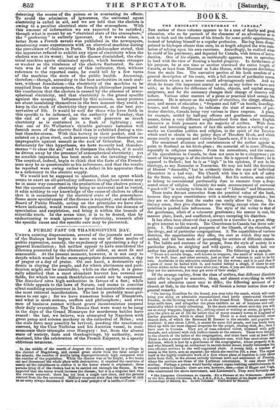A PUBLIC FAST OR THANKSGIVING DAY.
UNDER existing dispensations, several of the journals and some of the Bishops have begun to move on one of these modes of public expression, namely, the expediency of appointing a day of general humiliation ; but neither appear to have considered the dilemma presented by the alternative of either, as most fit and seasonable. At the present moment, however, it is not easy to decide which would be the more appropriate demonstration, a day of prayer or a day of praise. On one hand, a destructive epi- demic is slaying the people and for which abstinence and puri- fication might not be unsuitable; while on the other, it is gene- rally admitted that a most abundant harvest has covered our -fields, for which too much thankfulness could not be expressed. The Standard cites high authorities in favour of a fast; while the Globe appeals to the laws of Nature, and seems to consider silent confiding acquiescence in her great but inscrutable economy the most rational manifestation. The last is probably most ger- mane to our age ; for we have numerous bodies of Dissenters, and what is more serious, scoffers and philosophers ; and even men of business cannot without grave inconvenience suspend their daily avocations. The Te Deums that were wont to be sung in the days of the Grand Monarque for murderous battles have ceased : the last, we believe, was attempted by Napoleon with great pomp and solemn mockery in the cathedral of Milan ; and the stale farce may possibly be revived, pending the reactionary current, by the Czar Nicholas and his Austrian vassal, to com- memorate their triumphs over Hungary : but, from the altered state of society, fasts and thanksgivings, by authority, seem destined, like the celebration of the French Emperor, to a speedy lablivious terminus.
In the middle of the month of August the cholera appeared in a village in the district of Magdeburg, and caused great alarm from the fatal nature of the attacks, the number of deaths being disproportionately high compared with the number of the population. While the disease was at its height, a fire broke out and threatened the whole-place with destruction; it required the exertions of nearly all the inhabitants to confine it to the house where it originated; three persons lying ill of the cholera had to be carried out throngh the flames. It was -expected that the terror would increase the disease; but it is a singular fact that We reverse occurred; there has not been a single case since, and the persons rescued from the Are recovered. Milita7 surgeons state that the -number of sick Item army always thereates if theta if a near prospect of-a


























 Previous page
Previous page